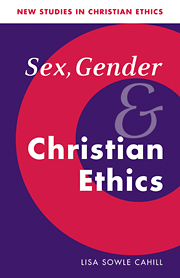Book contents
- Frontmatter
- Contents
- General editor's preface
- Acknowledgments
- 1 Sex, gender, and the problem of moral argument
- 2 Feminism and foundations
- 3 Particular experiences, shared goods
- 4 “The body” – in context
- An interlude and a proposal
- 5 Sex, gender, and early Christianity
- 6 Sex, marriage, and family in Christian tradition
- 7 The new birth technologies and public moral argument
- Concluding reflections
- Notes
- Index
- New Studies in Christian Ethics
4 - “The body” – in context
Published online by Cambridge University Press: 05 June 2012
- Frontmatter
- Contents
- General editor's preface
- Acknowledgments
- 1 Sex, gender, and the problem of moral argument
- 2 Feminism and foundations
- 3 Particular experiences, shared goods
- 4 “The body” – in context
- An interlude and a proposal
- 5 Sex, gender, and early Christianity
- 6 Sex, marriage, and family in Christian tradition
- 7 The new birth technologies and public moral argument
- Concluding reflections
- Notes
- Index
- New Studies in Christian Ethics
Summary
“The body” has come up for much attention in recent philosophical and theological work. Just why is an interesting question. Surely it is not that the relevance of the body to moral judgment has never before been recognized. Thomas Aquinas and Roman Catholic moral theology have given, if anything, too much attention to the body in defining sexual and gender norms. Hence the frequent charges of “physicalism” leveled against both. Indeed, ethics always has to do with the body in one way or another, for morality refers to human action. Most of the subdisciplines of ethics can be named according to the way they impinge on the human body – from sex and gender, to bioethics, to just war theory, and even to theories of economics, political organization, and government.
Current interest in the body seems to take one of two directions: affirmation of the body as constitutive of personhood or deconstruction of the body as produced by social discourse. Different as these two streams may seem, both flow from the Enlightenment, and their courses may not lie far apart. Both react against Enlightenment reason as universal and abstract; and against the modern scientific ideal of control over nature, including the body. Those who insist that the body is the environment of the mind – that embodiedness is constitutive of human consciousness – are correcting a tendency to see thought in ahistorical, and morality in intellectualistic or voluntaristic, terms (for example, as rational self-direction, existential choice, or I–Thou intersubjectivity).
- Type
- Chapter
- Information
- Sex, Gender, and Christian Ethics , pp. 73 - 107Publisher: Cambridge University PressPrint publication year: 1996

